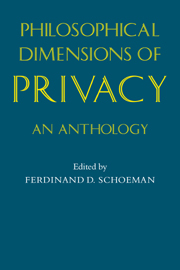Book contents
- Frontmatter
- Contents
- List of contributors
- Preface
- 1 Privacy: philosophical dimensions of the literature
- 2 Social distance and the veil
- 3 The origins of modern claims to privacy
- 4 The right to privacy [the implicit made explicit]
- 5 Privacy [a legal analysis]
- 6 Privacy as an aspect of human dignity: an answer to Dean Prosser
- 7 Privacy [a moral analysis]
- 8 Privacy, freedom, and respect for persons
- 9 Privacy and self-incrimination
- 10 Intimacy and privacy
- 11 The right to privacy
- 12 Why privacy is important
- 13 Privacy, intimacy, and personhood
- 14 Privacy: some arguments and assumptions
- 15 An economic theory of privacy
- 16 Privacy and the limits of law
- 17 Privacy and intimate information
- Selected bibliography
- Index of names
17 - Privacy and intimate information
Published online by Cambridge University Press: 12 December 2009
- Frontmatter
- Contents
- List of contributors
- Preface
- 1 Privacy: philosophical dimensions of the literature
- 2 Social distance and the veil
- 3 The origins of modern claims to privacy
- 4 The right to privacy [the implicit made explicit]
- 5 Privacy [a legal analysis]
- 6 Privacy as an aspect of human dignity: an answer to Dean Prosser
- 7 Privacy [a moral analysis]
- 8 Privacy, freedom, and respect for persons
- 9 Privacy and self-incrimination
- 10 Intimacy and privacy
- 11 The right to privacy
- 12 Why privacy is important
- 13 Privacy, intimacy, and personhood
- 14 Privacy: some arguments and assumptions
- 15 An economic theory of privacy
- 16 Privacy and the limits of law
- 17 Privacy and intimate information
- Selected bibliography
- Index of names
Summary
I knew the mass of men conceal'd
Their thought, for fear that if reveal'd
They would by other men be met
With blank indifference, or with blame reproved;
from Matthew Arnold's “The Buried Life”Privacy itself is suspect as a value. It makes deception possible and provides the context for concealing things about which we may feel ashamed or guilty. Embarrassed by this feature, defenders of privacy often argue that privacy is a necessary response to a social and political world that is insufficiently understanding, benevolent, respecting, trustworthy, or caring. I shall call this rationale for privacy “reactive.” This response assumes that we would no longer care who knows the most intimate facts about ourselves were the world morally improved. Some have even suggested that, divorced from its prudential motivation, a proclivity for privacy should be seen as an attitude that impedes the realization of a sense of community and at the same time makes the individual more vulnerable to selective disclosures on the part of others. [If everything about a person is already known by others, that person need not fear revelations. If he (or she) discovers that others are more like him than he first suspected, he is less subject to the intimidations engendered by a sense of comparative inferiority.]
Philosophers and legal theorists have discussed privacy as valuable independent of its effectiveness in protecting persons from a morally harsh world. Charles Fried, Robert Gerstein, James Rachels, and Richard Wasserstrom, have elaborated the ways in which the intimate qualities of some interpersonal relationships would not be possible outside the context of privacy.
- Type
- Chapter
- Information
- Philosophical Dimensions of PrivacyAn Anthology, pp. 403 - 418Publisher: Cambridge University PressPrint publication year: 1984
- 22
- Cited by

